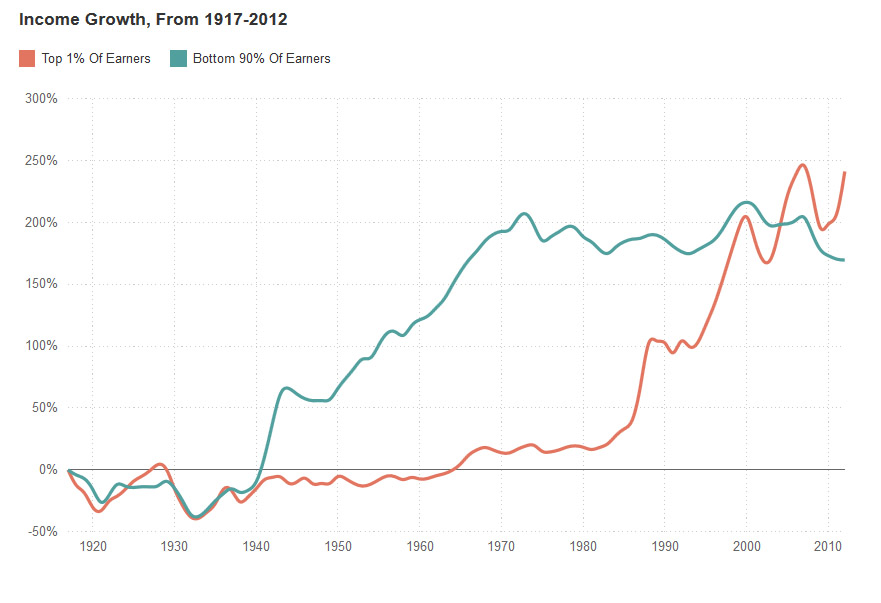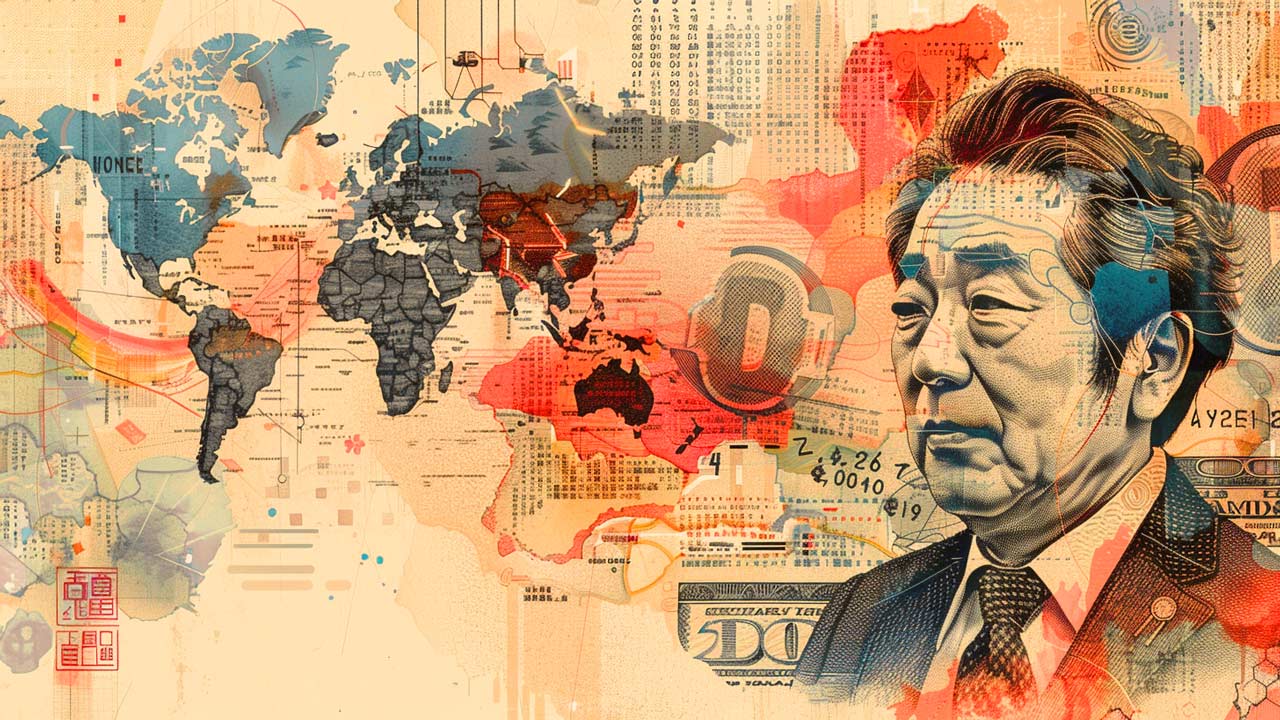Income Inequality and the End of the Gold Standard
Income inequality has been a hot topic since the bailouts of the big banks following the 2008 financial crisis. A recent article from National Public Radio’s Planet Money shines a light on the history of the trend, which has only gotten worse in the past few years.
Beginning in the Great Depression, and continuing until about 1970, the average income of the bottom 90% of United States wage earners exploded. It grew more than 200%, while the top 1% saw just a tiny fraction of that income growth.
Beginning the 1980s, that trend reversed dramatically. Since then, the bottom 90% of Americans have had relatively stagnant income growth, while the top 1% has grown its income nearly 250%. What is NPR’s explanation for this?
…a combination of global competition, automation, and declining union membership, among other factors, led to stagnant wages for most workers.”
NPR simply blames the stagnant wages of America’s working class in the past four decades on shipping jobs overseas, technological advances, and a decline of unions. But NPR doesn’t take the next step of trying to explain these trends. Perhaps that’s because they would have to acknowledge the effects of central bank policies on America’s jobs picture.
What’s the most important date on the chart above? 1971 – the year Nixon closed the “gold window.” It was in this year that the US dollar officially become completely fiat. We could no longer exchange our paper money for gold.
This paved the way for the modern era of monetary manipulation by the Federal Reserve. Without a tie to the real value of gold, the US dollar becomes a much more fluid currency. Indeed, since 1971, the dollar has lost about 80% of its purchasing power. So not only are wages stagnant, but those wages buy less.
Even worse, as the Fed manipulates the dollar, it artificially inflates financial assets to benefit the financial elites. These same financial elites are the first to acknowledge the gains they reap from these policies. George Soros and Paul Singer said it not too long ago in Davos. Or watch this interview with Marc Faber who soundly thanks the Fed for padding his pockets with stock gains. However, he still warns that this era of central bank power will not end well.
Get Peter Schiff’s latest gold market analysis – click here – for a free subscription to his exclusive weekly email updates.
Interested in learning more about physical gold and silver?
Call 1-888-GOLD-160 and speak with a Precious Metals Specialist today!




 As fiscal imbalances persist, driven by coercive measures and artificial currency creation, the middle class faces erosion and purchasing power dwindles. But as the world hurtles towards a potential reckoning, the lingering question remains: can this precarious balance last, or are we teetering on the brink of a cataclysmic economic shift?
As fiscal imbalances persist, driven by coercive measures and artificial currency creation, the middle class faces erosion and purchasing power dwindles. But as the world hurtles towards a potential reckoning, the lingering question remains: can this precarious balance last, or are we teetering on the brink of a cataclysmic economic shift? With the AI boom and green energy push fueling fresh copper demand, and with copper mines aging and not enough projects to match demand with supply, the forecasted copper shortage has finally arrived in earnest. Coupled with persistently high inflation in the US, EU, and elsewhere, I predict the industrial metal will surpass its 2022 top to reach a […]
With the AI boom and green energy push fueling fresh copper demand, and with copper mines aging and not enough projects to match demand with supply, the forecasted copper shortage has finally arrived in earnest. Coupled with persistently high inflation in the US, EU, and elsewhere, I predict the industrial metal will surpass its 2022 top to reach a […] America’s trust in its institutions has rapidly eroded over the past 20 years. We have a lower level of trust in our judicial system and elections than most European countries. Some of this is natural, as Americans are uniquely individualistic, but much of it arises from repeated government failures.
America’s trust in its institutions has rapidly eroded over the past 20 years. We have a lower level of trust in our judicial system and elections than most European countries. Some of this is natural, as Americans are uniquely individualistic, but much of it arises from repeated government failures. Decades of negative interest rate policy in Japan have ended. That could mean the end of the $20 trillion “yen carry trade,” once one of the most popular trades on foreign exchange markets, and a chain reaction in the global economy. The yen carry trade is when investors borrow yen to buy assets denominated in […]
Decades of negative interest rate policy in Japan have ended. That could mean the end of the $20 trillion “yen carry trade,” once one of the most popular trades on foreign exchange markets, and a chain reaction in the global economy. The yen carry trade is when investors borrow yen to buy assets denominated in […] Beneath the veneer of headline job gains, the American economy teeters on the brink: native employment dwindles as part-time and immigrant jobs surge. Government hiring camouflages looming recession warnings. Inflation and political blunders worsen the crisis, fueling public outrage at the establishment’s mishandling of the economy.
Beneath the veneer of headline job gains, the American economy teeters on the brink: native employment dwindles as part-time and immigrant jobs surge. Government hiring camouflages looming recession warnings. Inflation and political blunders worsen the crisis, fueling public outrage at the establishment’s mishandling of the economy.
Leave a Reply